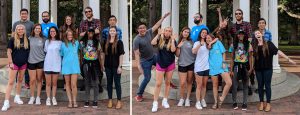Home Page
About Our Research Group
We are interested in sorting the underlying structural and functional consequences of behavior/neurocognition in disease. Our goal is to develop a better understanding of how cellular function is affected by HIV-1 infection and (end)cannabinoids. Our research is focusing on the cellular, functional, and behavioral mechanisms of the neurotoxic consequences of HIV-1 protein on the central nervous system and the role of the (endo)cannabinoid system.
We use state-of-the-art live cell imaging, electrophysiology, behavioral techniques:
Live Cell Imaging In Vitro. To understand the differential responses to (endo)cannabinoids in the presence of HIV-1 proteins we make use of an in vitro cell culture model, focusing on hippocampal neurons and prefrontal cortex neurons. Live cell imaging is conducted on the soma and dendrites of living cultured neurons using a Zeiss Axio Observer Z.1 inverted microscope (Carl Zeiss) with an automated, computer-controlled stage encoder with environmental control (37°C, 95% humidity, 5% CO2). We examine HIV/endocannabinoid-induced structural changes and functional changes in ion homeostasis, involving imaging [Na+]i and [Ca2+]i ions, mitochondrial membrane potential, and dendritic spines in living cultured neurons.
Electrophysiology In Vitro and Ex Vivo. To examine the effects of (endo)cannabinoids in the context of HIV-1 on the electrical properties and synaptic function of striatal and/or prefrontal cortex neurons we perform whole cell-patch clamp recordings. Whole cell-patch clamp recordings are conducted in voltage- and current-clamp mode with conducting paired-pulse stimulation, dual whole cell patch recordings, and extracellular cell-attached recordings.
Behavioral Studies. To sort out the cellular sites of (endo)cannabinoids and HIV-1 protein interaction, we make use of transgenic and knockout mice. We conduct operant and classical conditioning behavioral tasks that involve the prefrontal cortex and hippocampus, including the Go/No-Go task, the 5-Choice Serial Reaction Time task, and the Fear Conditioning task.
Interested in working as an Undergraduate in our lab? (We have filled our positions for Fall 2022/Spring 2023)
If you are an undergraduate, have a passion for behavioral neuroscience, and are specifically interested in our behavioral neuroscience research let us know. Undergraduates may work in the lab as volunteers or, on a limited basis, as independent study students. We take new students in the fall, spring, and summer. If you are interested in a research position for our behavioral studies, please contact us at sfitting@email.unc.edu with a statement describing your interest in the lab and including a resume with your current GPA. Applications by members of all underrepresented groups are encouraged.
Our lab supports the University’s core values encouraging diversity and equal educational and employment opportunities throughout our community. These values are articulated in the UNC Non-Discrimination Policy and by the Office of Diversity and Multicultural Affairs.

